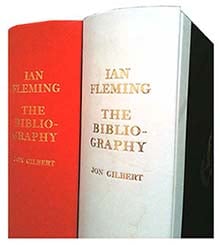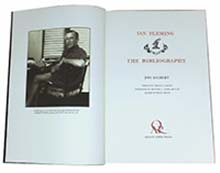The ILAB Breslauer Prize for Bibliography, given every fourth year to the most outstanding scholarly book about books and worth $10,000, is one of the most prestigious prizes in the field of bibliography.
16th ILAB Breslauer Prize for Bibliography

The Jury, consisting of Felix de Marez Oyens (President of the B.H. Breslauer Foundation), David Adams (Manchester University), Jean-Marc Chatelain (Bibliothèque Nationale de France), Poul Jan Poulsen (Aldus Antikvariat, Denmark), Umberto Pregliasco (Libreria Antiquaria Pregliasco, Italy) and Arnoud Gerits (A. Gerits & Son, The Netherlands), has honoured Jon Gilbert with the 16th Prize for his outstanding and superb bibliography on Ian Fleming and his works:
Jon Gilbert: Ian Fleming The Bibliography
Preface by Fergus Fleming. Foreword by Michael L. Vanblaricum. Edited by Brad Frank. London, Queen Anne Press, 2012.
The quality of the submitted books was high and many books needed a thorough discussion: the diversity of subjects was impressive, the scholarship and devotion put into each and every publication could only evoke admiration. The Jury realized that it was discussing, in many cases, lifelong interest and devotion to a certain subject or topic, and that many authors have worked on their bibliography in evenings, during week-ends and during holidays as many authors have a day-to-day professional life, often outside the world of books.
The Jury did not come easily to this decision: there were many books of impressive quality that might have been awarded the Prize as well. But the task of any Jury is, at the end of the day, to make a decision, and the Jury awarded Jon Gilbert's book: an outstanding work of meticulous scholarship, covering every aspect of Fleming's writings, manuscripts, proofs, corrected or uncorrected, first and all later impressions, paperback editions and all subsequent printings and editions. It gives insight into the conception of a book, the editorial process, in short, Jon Gilbert's work covers all that possibly is to know, all one can possibly know, about Fleming and his writings. And it not only shows that modern authors are collectible, but also that modern authors merit exhaustive bibliographical scholarship. Ian Fleming. The Bibliography is, in itself, an encouragement to collect and outstanding proof that bibliographical scholarship is not limited to pre-1900 books and authors.
Jon Gilbert's book has set a standard that will not easily be equalled and is, in every aspect, a most deserved winner of the 16th ILAB Breslauer Prize for Bibliography.
The 16th Prize will be awarded in an official ceremony during the 41st Congress of the International League of Antiquarian Booksellers (ILAB), preceded by ILAB's International Antiquarian Book Fair, both in Paris in April 2014, and both coinciding with celebrations around the 100th anniversary of the Syndicat national de la Librairie Ancienne et Moderne (SLAM).
Arnoud Gerits (Secretary, ILAB Breslauer Prize for Bibliography)
From the LILA/ILAB newsletter, re-published with permission of the LILA/ILAB. Books Tell You Why is a member.









